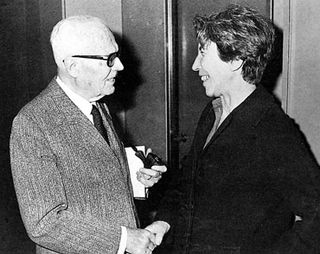A Quote by Barbara De Angelis
Temporary feelings of regret are a normal part of the mourning process. This helps us retrieve our lost dreams. If we hold on to regret, we risk trapping ourselves in a prison of unrealized dreams from which it is difficult to escape.
Related Quotes
I regret that I was never an athlete. I regret there isn't time in life. I regret that so many of my friends have died. I regret that I was not brave at certain times in my life. I regret that I'm not beautiful. I regret that my conversation is largely with myself. I'm not part of the conversation of the world.
In each of us there is another whom we do not know. He speaks to us in dreams and tells us how differently he sees us from the way we see ourselves. When, therefore, we find ourselves in a difficult situation to which there is no solution, he can sometimes kindle a light that radically alters our attitude - the very attitude that led us into the difficult situation.
All I know for sure is that dreams are the pictures of states wanting to turn into processes. Dreams are maps of the beginning of an otherwise unchartered trip into the unknown. They are pictures of the unknown which appear in many channels. Because process work is body-oriented, I put a stress upon feelings, but dreams are not pictures of just feelings; they are pictures of the way the unknown is showing itself in a given moment.
A lot of us first aspired to far-ranging travel and exotic adventure early in our teens; these ambitions are, in fact, adolescent in nature, which I find an inspiring idea...Thus, when we allow ourselves to imagine as we once did, we know, with a sudden jarring clarity, that if we don't go right now, we're never going to do it. And we'll be haunted by our unrealized dreams and know that we have sinned against ourselves gravely.
I like dreams. I think there's a lot of information in them. I spent a lot of time on Jungian analysis and dreams are an elemental part of that process. Carl Jung believed very much in the power archetypes in dreams, what dream imagery means, and how you can tie it into deeper self examination. It's a big part of the therapeutic process.
We have lost that which has made us great over the generations, and that is the sense of individual and personal responsibility that we can come up, we can pursue our dreams and our aspirations and we won't be blocked by government regulation, by the inability to get a loan as a small business to make our dreams come true.
If we have goals and dreams and we want to do our best, and if we love people and we don’t want to hurt them or lose them, we should feel pain when things go wrong. The point isn’t to live without any regrets, the point is to not hate ourselves for having them… We need to learn to love the flawed, imperfect things that we create, and to forgive ourselves for creating them. Regret doesn’t remind us that we did badly — it reminds us that we know we can do better.






































